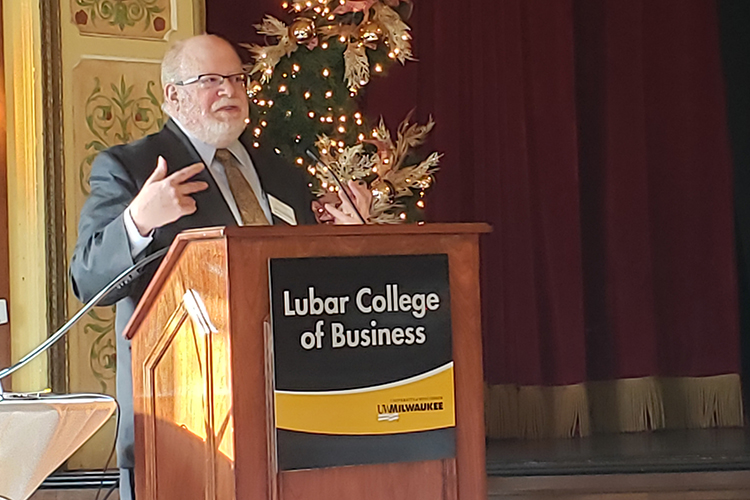Adam S. Posen, President of the Peterson Institute for International Economics, spoke recently in the Bradley Distinguished Lecture Series about what he terms the corrosion of globalization.
“I choose the word corrosion very carefully,” he said. “Globalization should be thought of as a multilayered factor. It’s not just trade in manufacturing. It is the flow of ideas, capital, people, educational networks, business networks, intellectual engagement, and research.”
Under successive administrations, he said, the U.S. government has moved towards viewing itself as player rather than a referee or commissioner.
The trade wars against China instituted by former President Trump – and not “undone” by President Biden — are not necessarily unwarranted, he noted.
“But once you go down this road, you start encouraging others to go down this road. Now, it has changed the economic picture. “
There is a reason why free market economists have argued for freer trade for more than 250 years, Posen stated, because tariffs tend to cause corruption and put the burden on the importer. Today, tariffs are at their highest rate for many countries since the 1930s.
This is not simply a Trump or Biden phenomenon, he said. “The U.S. has been withdrawing from economic globalization for more than 20 years.”
He noted that, over the last two decades, most countries other than the U.S. have increased their share in trade of goods and services as a percent of GDP. The United States, on the other hand, has remained flat. “We’re an outlier.”
Similarly, in nominal terms, foreign direct investment into the United States has stagnated since 2000.
“Again, in terms of trade and investment, we’re just not as much part of the game as what people think we are,” Posen said.
Overall, trade itself has actually proven resilient, which he said is not a surprise historically.
But other parts of global interdependence — including migration, foreign direct investment, and technology — are fraying.
“To me, what we are losing are business and intellectual networks that are important for innovation and bringing the world economy forward,” he said.
“I am not arguing that we should ignore national security, but I do think that we need to be aware of the economic costs of the national security measures we take and how those effects may play back on the national security issues.”
Posen predicted that the changes to the macro and geopolitical landscape will include:
- weaker than average growth rates in almost all economies
- the continued decoupling of China and the U.S. – and to a lesser degree the European Union – on investment, technology, business networks, and capital flows
- instability in the developing world and military build-ups that will reinforce each other
- rising fiscal sustainability risk that will be partially offset by economic nationalism
“We are moving, sadly, into a world of more conflict and more proxy wars,” he said. “I would argue that the U.S .withdrawal from the world is a contributing factor to this.”
Over his career, Posen has contributed to research and public policy regarding monetary and fiscal policies in the G-20, the challenges of European integration since the adoption of the euro, China-U.S. economic relations, and developing new approaches to financial recovery and stability. He was one of the first economists to seriously address the political foundations of central bank independence and to analyze Japan’s Great Recession as a failure of macroeconomic policy. While at the Federal Reserve Bank of New York from 1994 to1997, Dr. Posen co-authored the book Inflation Targeting with Ben Bernanke, Thomas Laubach, and Frederic Mishkin.
The Bradley Distinguished Lecture Series provides important insights into economic policies and actions that reinforce people’s faith in American democratic capitalism and free enterprise, and foster America’s global economic competitiveness, entrepreneurialism, and innovation.
The Series is sponsored by the Lubar College of Business and The Lynde and Harry Bradley Foundation.
